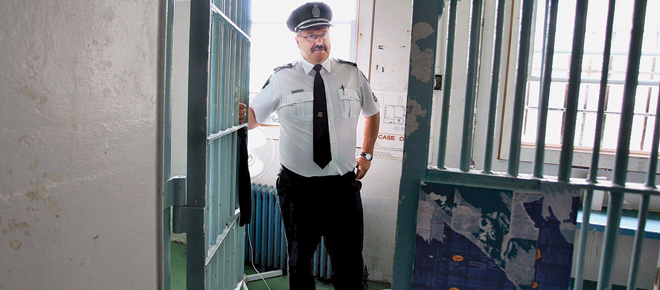Why Canada’s bail system creates more crimes than it prevents
A troubling new report from the John Howard Society
Paul Daly / CP
Share

If you ever find yourself arrested for a crime you didn’t commit, hope it happens in Prince Edward Island. At least then you’d have a decent chance of getting out on bail before your trial. Manitoba would be your least-preferred option.
A report earlier this month from the John Howard Society of Ontario reveals a host of problems with bail as it currently operates in that province. Combined with data from other provinces, it’s apparent our country’s bail system requires a major overhaul, in the name of fairness and efficiency, not to mention the concept of innocent until proven guilty.
Bail allows individuals accused of crimes to enjoy their liberty until a court decides their fate. Unlike the American system of an upfront cash bail requirement—familiar to anyone who’s ever read an Elmore Leonard or Janet Evanovich novel, or watched Law & Order—Canadian bail instead relies on sureties. No money is demanded immediately. Rather, the accused may be released into the care of a friend or relative who forfeits a set sum of money if the individual skips town or otherwise fails to abide by the conditions of his release.
But while the right to “reasonable bail” is enshrined in the Canadian Charter of Rights and Freedoms, it has become steadily more difficult to obtain, subjected to an increasing number of unreasonable conditions and transformed into something akin to extrajudicial punishment.
The John Howard Society report found the average bail release in Ontario now carries six separate restrictions, beyond merely staying out of trouble until the trial. The most frequent of these include refraining from using alcohol or drugs, obeying a curfew, staying away from certain locations or people, not using cellphones and attending high school full-time. Many of these strictures, however well-intentioned, have nothing to do with the crime in question. “Courts should not be in the business of mandating self-improvement,” the John Howard Society report complains. At least, not until a sentence has been handed down.
Imposing a host of punitive bail conditions effectively dispenses punishment before the accused has a chance to give his or her defence. Keep in mind that an individual on bail is still legally considered to be innocent. Of course, bail isn’t the only aspect of Canada’s legal system that seems intent on imposing punishment first and holding a trial second: Recall British Columbia’s recent innovations with their drunk-driving law, since modified, that initially revoked licences and impounded cars without any recourse to a defence. It’s a trend that demands strenuous objection.
Further, aggressive enforcement of arbitrary bail conditions, sometimes by special police units, often leads to an unnecessary spiralling of legal problems. Imposing cold-turkey abstinence on an alcoholic or drug addict, for example, seems both unnaturally harsh and doomed to failure. And being caught violating bail conditions can lead to charges far more serious than any original offence. Our bail system often creates more crimes than it prevents.
Such a scenario, it’s worth noting, is indicative of a much bigger problem facing Canada’s justice system. As serious and violent crimes undergo a significant secular decline, more and more effort and resources are put into policing minor criminal acts such as marijuana possession or bail-condition violations. Taxpayers are not benefiting from lower crime rates.
And tougher bail conditions have certainly contributed to Canada’s rising demand for prison space. Since the 1980s, the share of prisoners held in remand (rather than granted bail) across Canada has tripled. Within the provincial prison system, inmates awaiting trial now outnumber prisoners who have been formally convicted and sentenced for a crime. And across the country, the odds an accused will be denied bail vary hugely—in P.E.I., a mere 15 per cent of all prisoners are in remand, compared to 64 per cent in Manitoba. This massive discrepancy largely comes down to variations in provincial legal tradition and the discretion of judges.
The news isn’t all bad when it comes to bail. Prisoners once saw their pre-sentence jail time credited on a two-for-one basis at sentencing. This led some crafty defence lawyers to delay bail hearings in order to maximize their clients’ time in remand and, thus, reduce their overall jail time in the event of a guilty verdict. “Truth in sentencing” legislation introduced by Ottawa in 2010 put an end to such generous crediting; recent data now suggest it’s been modestly successful in reducing the number of prisoners in remand.
With that loophole plugged, Ottawa should turn its attention to other more pressing problems with bail. Our jails ought to house prisoners convicted of crimes, not those awaiting their day in court. Bail should be equally accessible across the country. And any conditions should not be so onerous or arbitrary as to create new crimes on their own. Bail is a constitutionally protected right of all Canadians, not some make-work project for the legal system.